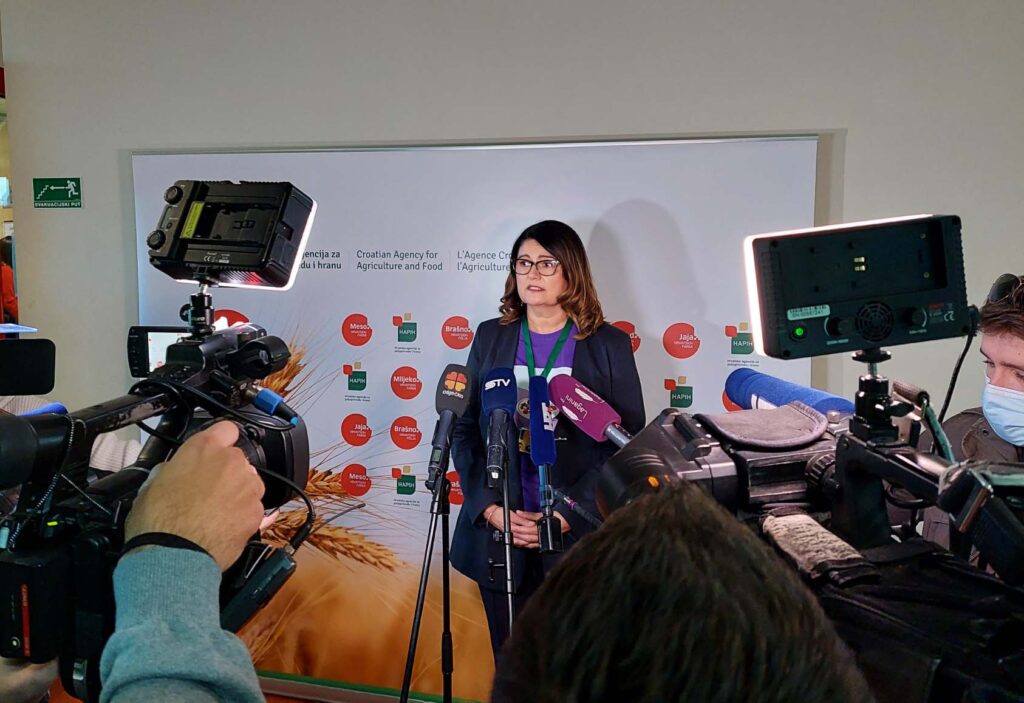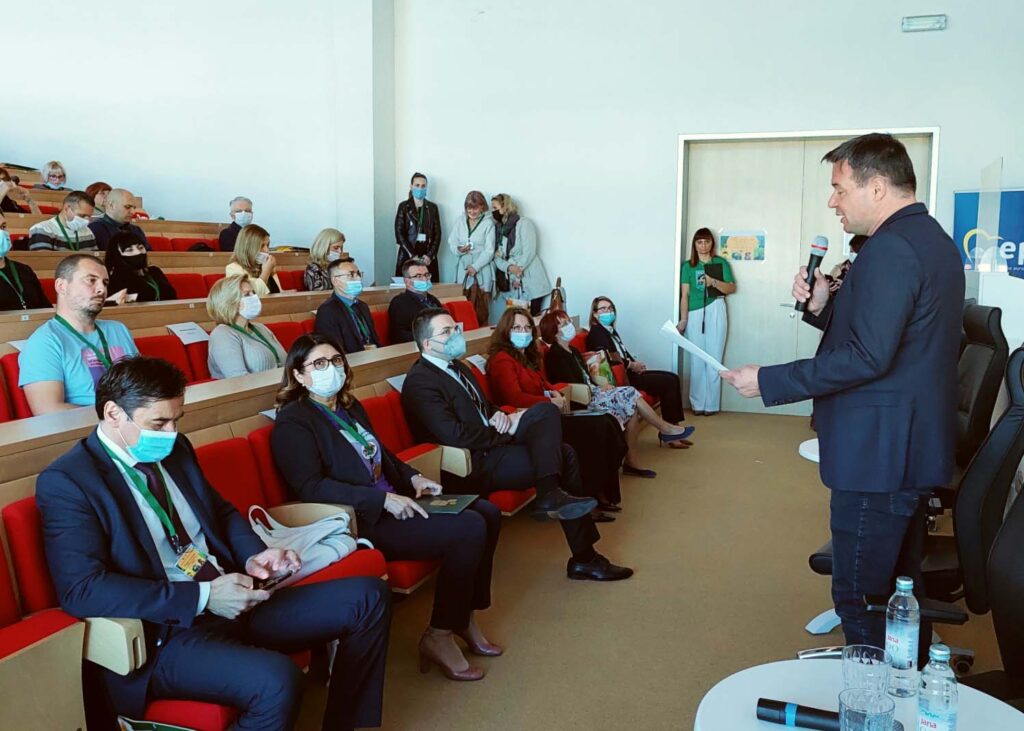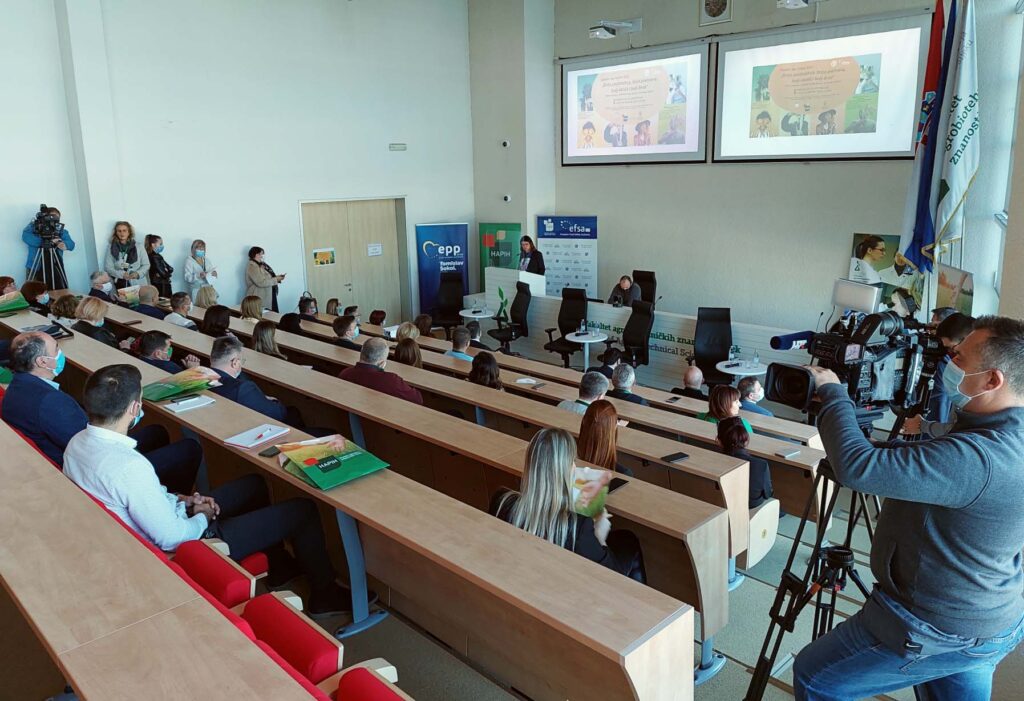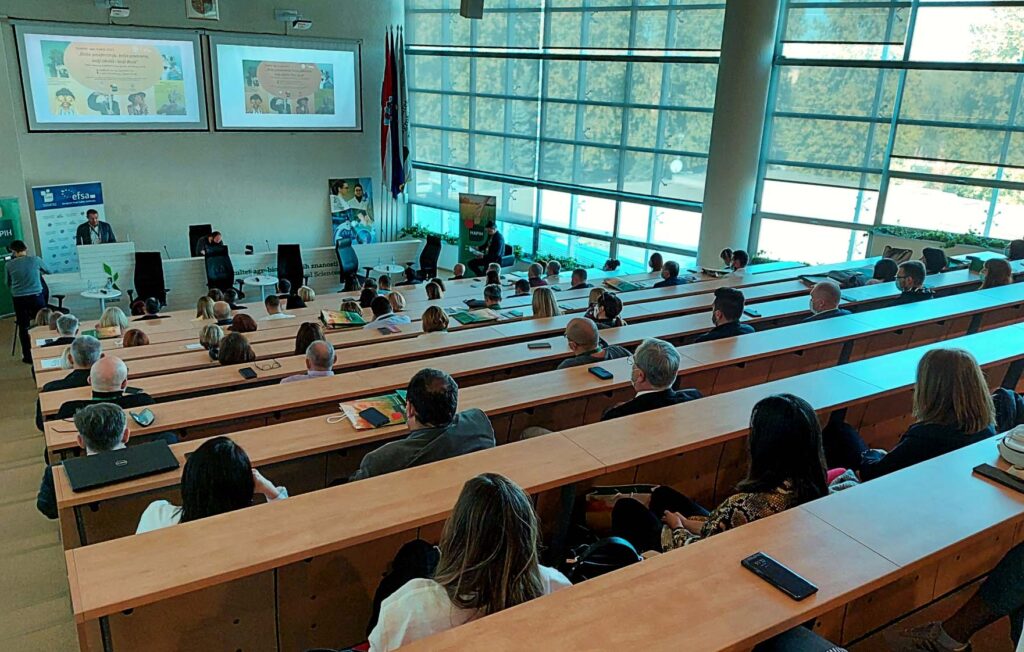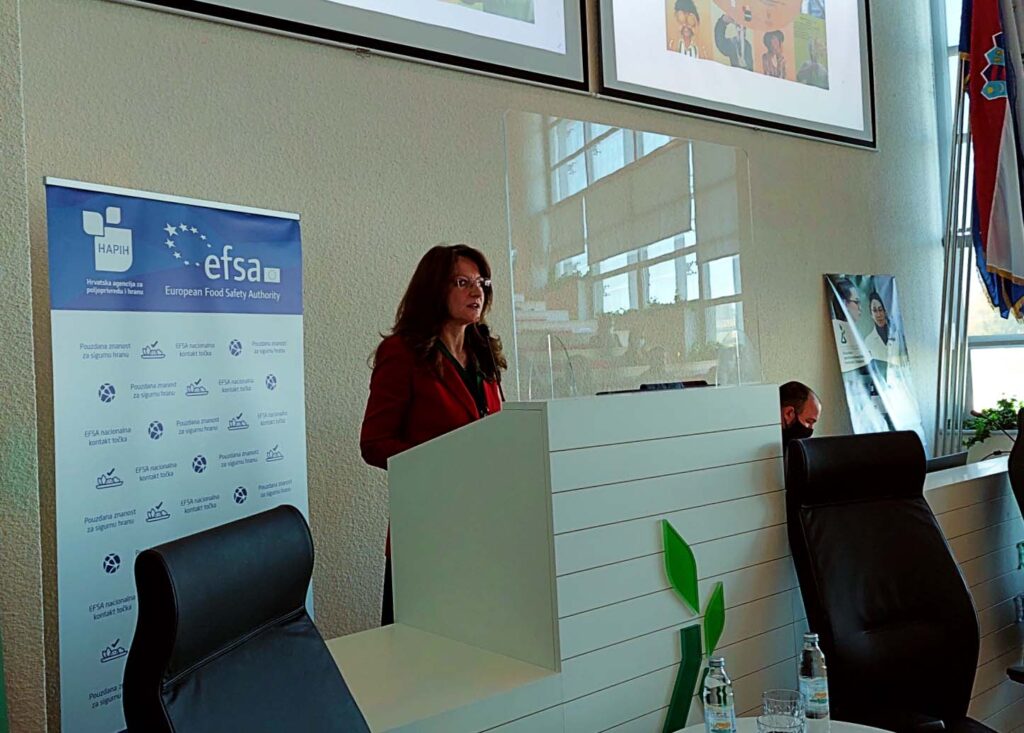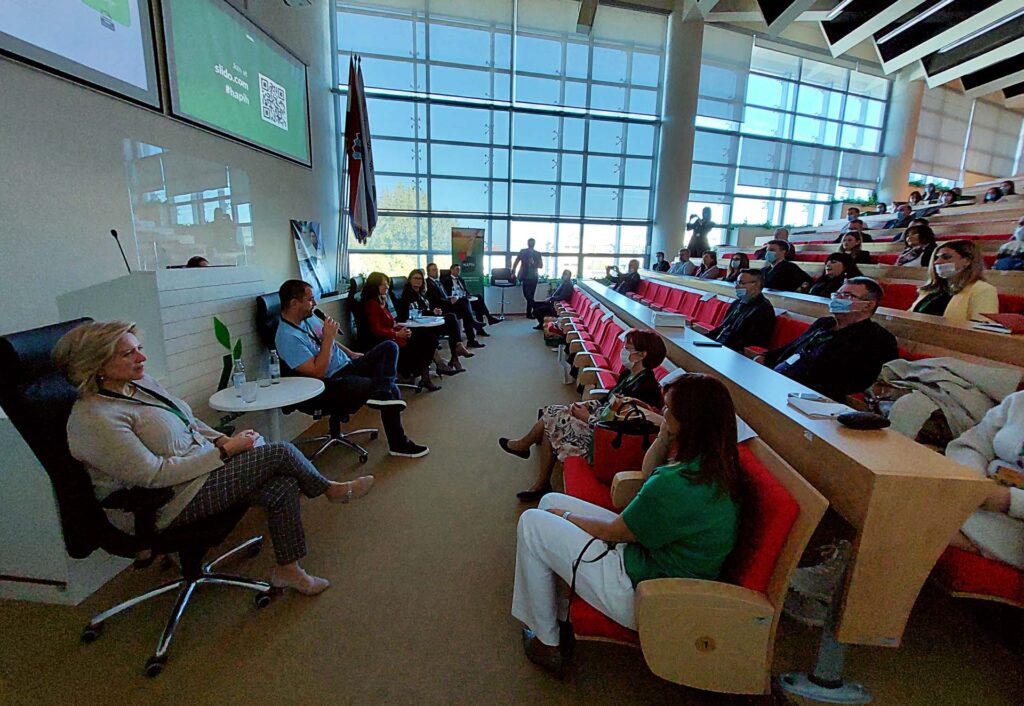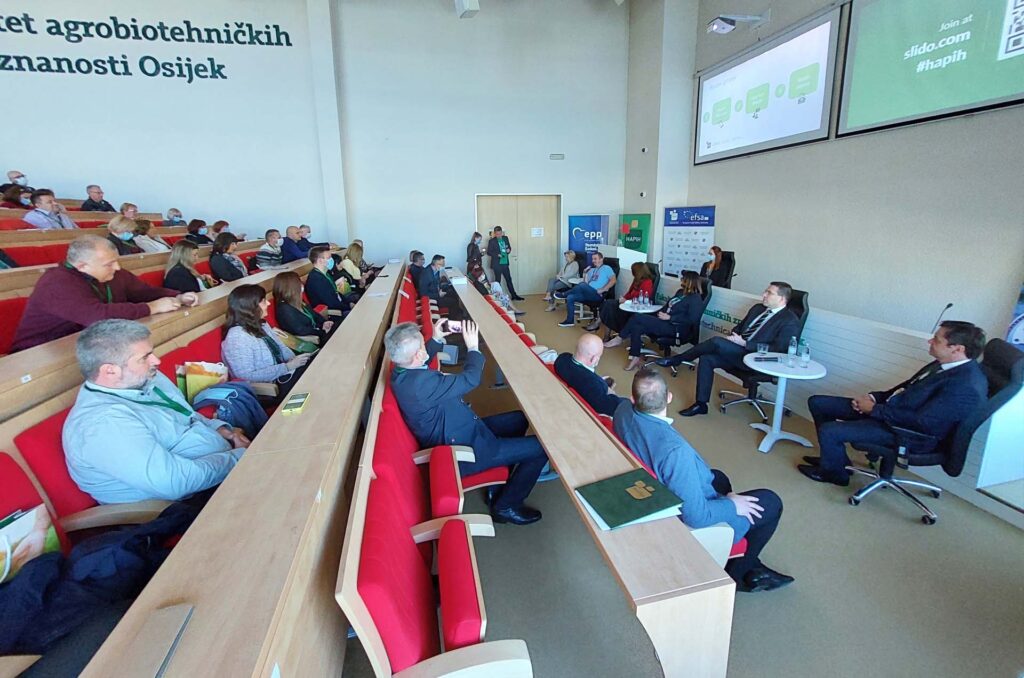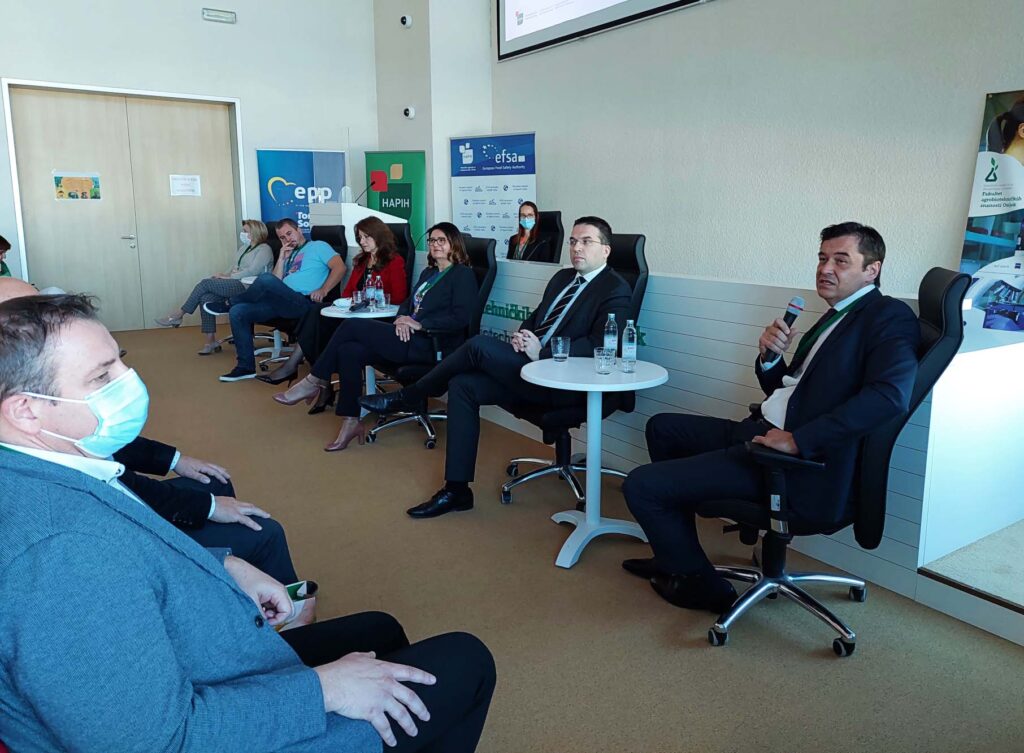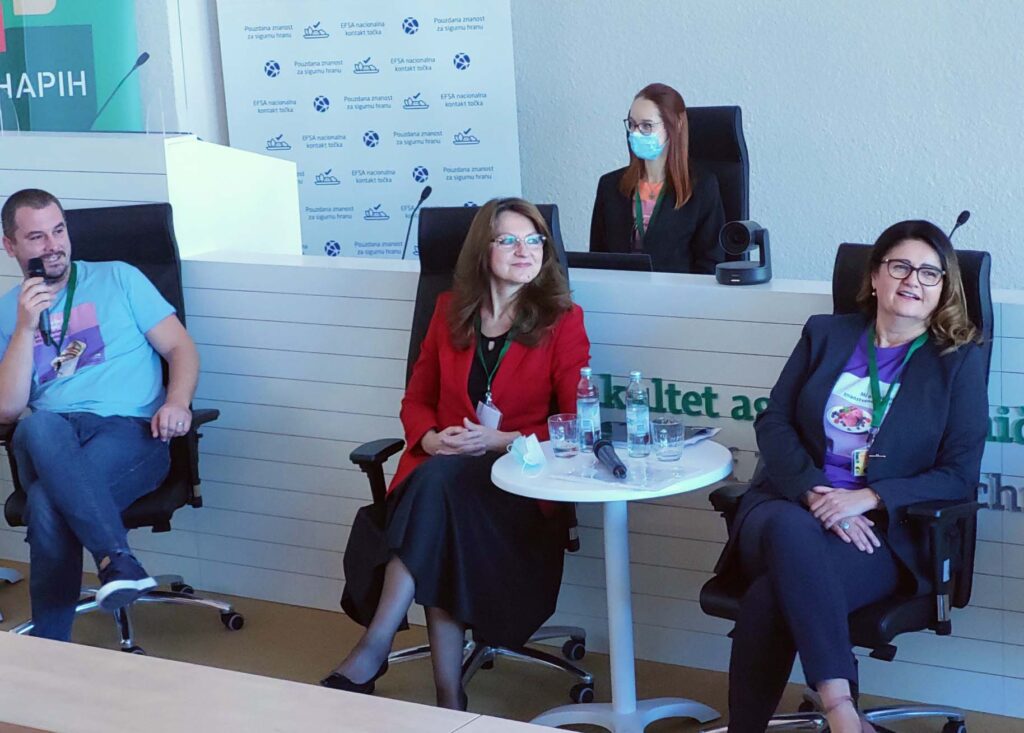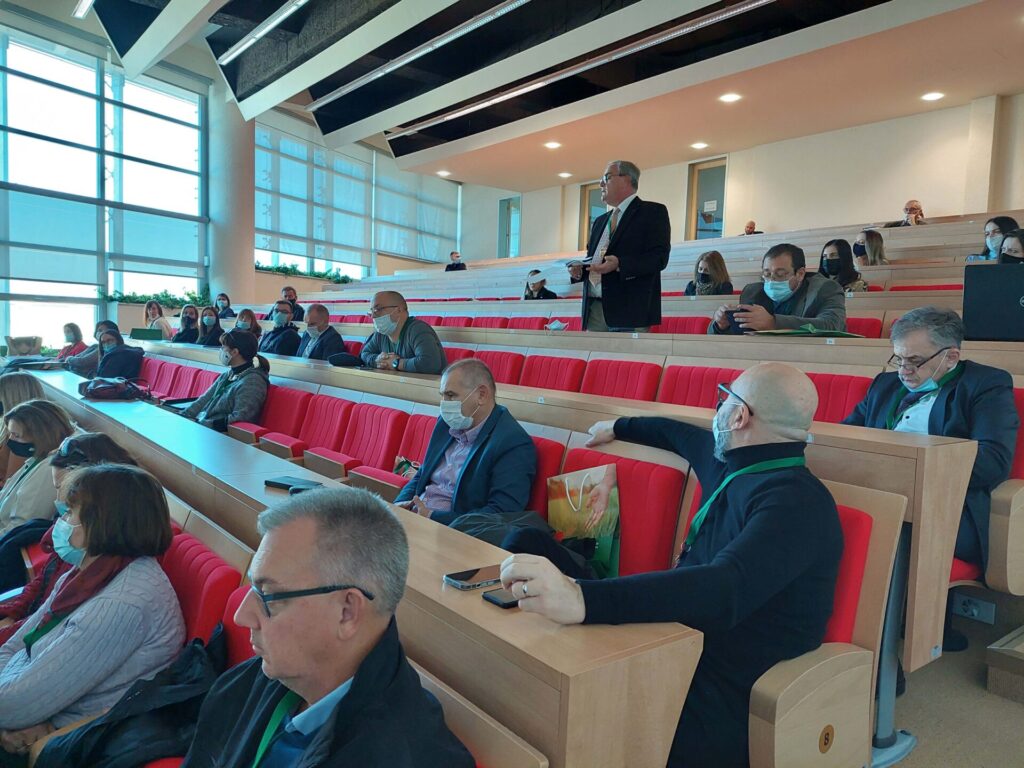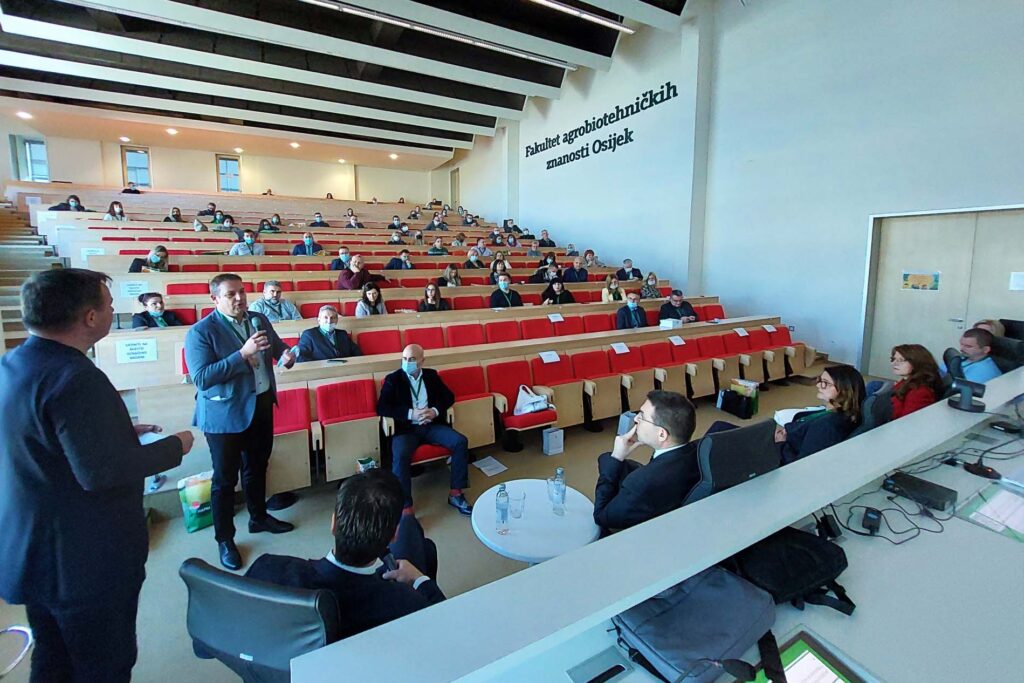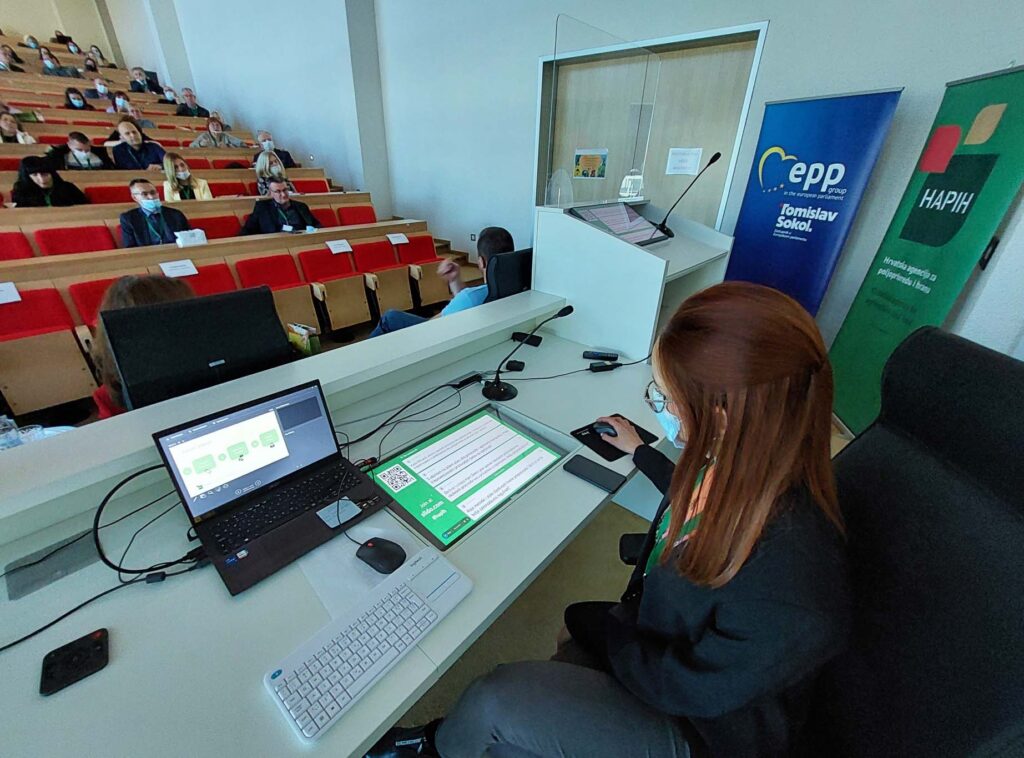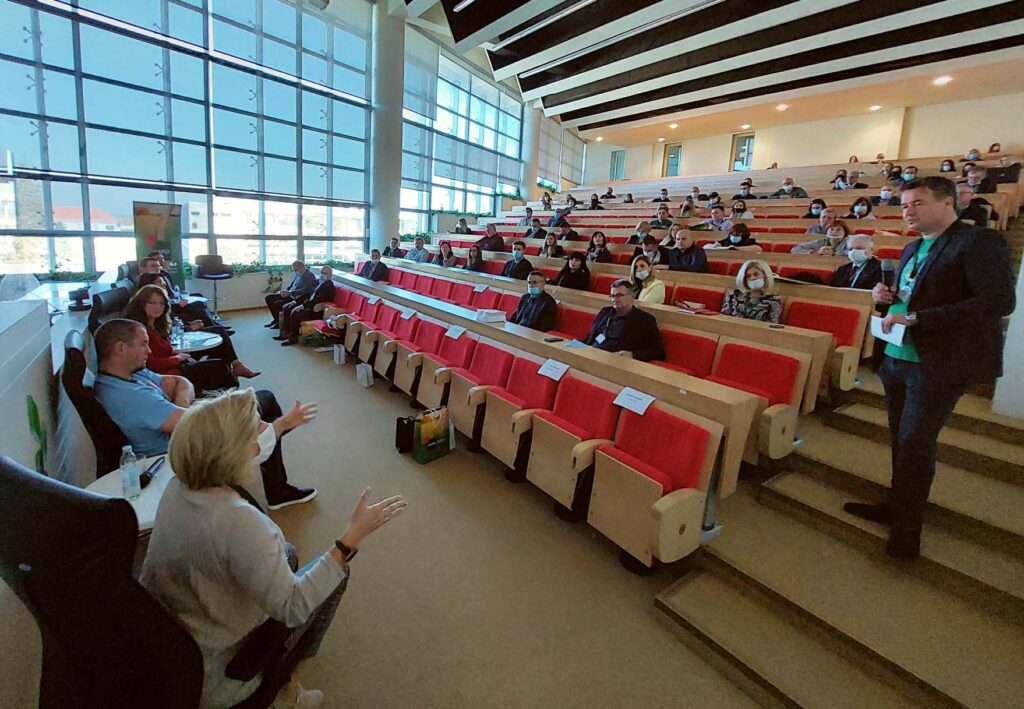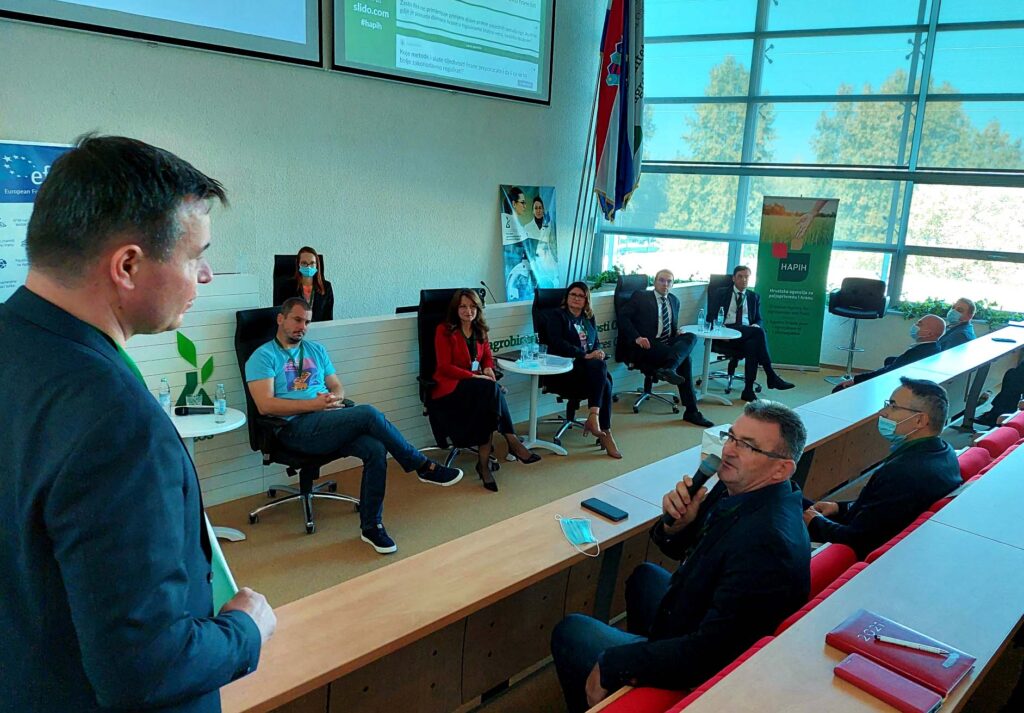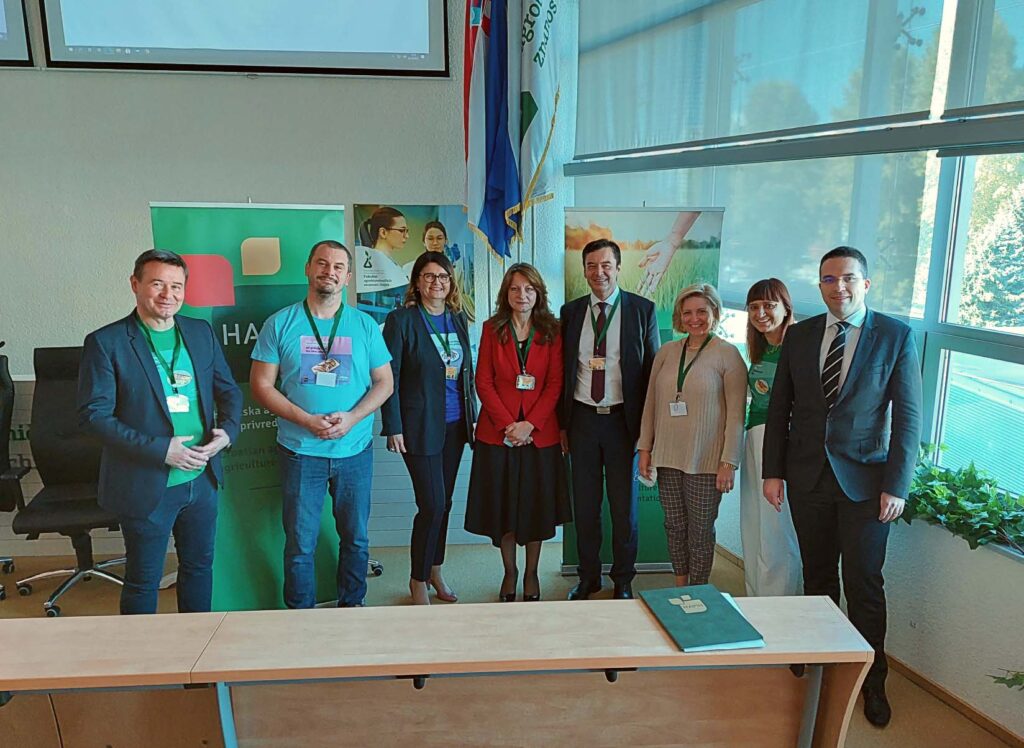“Better production, better nutrition, a better environment and a better life” was the topic of a round table organized by the Croatian Agency for Agriculture and Food (HAPIH), under the auspices of the Ministry of Agriculture and the Croatian Chamber of Economy, with the technical support of the Food and Agriculture Organization (FAO) and the European Food Safety Authority (EFSA). It was organised at the Faculty of Agrobiotechnical Sciences Osijek, the last Monday in October, a month when the world celebrates Bread Day as well as World Food Day.
At this panel discussion, representatives of the public and private sector, under the skilful moderation of well-known journalist and editor Mislav Togonal, exchanged views in a dynamic and productive dialogue. Panellists were a member of the European Parliament Tomislav Sokol, Director General at the Directorate-General for Veterinary and Food Safety of the Ministry of Agriculture Tatjana Karačić, Vice President for Agriculture and Tourism at the Croatian Chamber of Economy Dragan Kovačević, Director of Research & Development at Podravka Ltd. Jasmina Ranilović, owner of a family-run farm and finalist in this year’s selection of best farms „Zlata vrijedan“ from Osijek-Baranja County Stjepan Dumančić, and Executive Director of the Croatian Agency for Agriculture and Food Darja Sokolić.

“With this event, we wanted to focus on one of the biggest challenges of the 21st century – the transformation of agri-food systems and thus convey the FAO’s message that we are all called to be a part of this change,” said Director Sokolić, pointing out that by choosing this year’s topic for the World Food Day, which is celebrated in almost 150 countries over the world, FAO wanted to warn us that the way we produce, consume and, unfortunately, waste food, has a huge impact on our planet, putting unnecessary pressure on natural resources, the environment and climate. With the ongoing climate change, which includes extreme weather conditions, as well as land degradation and biodiversity loss, these are challenges that need to be addressed today. Our choices as producers and consumers today, affect how tomorrow will look like.
Science- and expertise-based approach to present challenges
“Responding to these challenges requires a science- and expertise-based approach, the one that addresses the broad range and complexity of these issues holistically and sustainably. Agri-food systems are dynamic structures, in a state of constant change and adjustment, which makes building effective collaborations with all its stakeholders extremely complex, but also necessary for transformation. These are the challenges that all of us are facing,” said Darja Sokolić. Gökçe Akbalık, Food Safety Consultant from FAO Regional Office for Europe and Central Asia, spoke to the participants via a video broadcast, emphasizing that to eliminate world hunger, it is essential to harmonize our relationship with nature, preserve biodiversity, mitigate climate shocks and sustainably produce food.

“We need to produce more using less, be more efficient and effective. The solution lies in a systematic approach to the agri-food system transformation for achieving the “4B’s” – better production, better nutrition, a better environment and a better life for all,” said Akbalik. According to FAO, the accelerators for improving the system are technology, innovation, data, the support of governing structures and institutions. However, there is a special emphasis on the actions of the individuals and the collective that can contribute to the improvement of the system.
“What needs to be done to achieve sustainable production? Change policies, mindsets and behaviours as well as investment priorities. Therefore, let us not underestimate the strength of each individual and collective, because our actions today determine our future”, said Gökçe Akbalık, calling on all the participants to have responsibility in both their minds and hearts.
Our competitiveness lies in the quality of the products
Tatjana Karačić pointed out that Croatia has good potential and a significant opportunity to improve current agricultural productivity through climate practices and access to green technologies, the use of digital tools, directing investment into development, adopting improved technologies and production practices while increasing product value. She announced that in the implementation of the ambitious goals of the European Green Deal and the strategy From Farm to Fork, certain activities will be accompanied by financial instruments, both national and European.

She said, among other things, that the adoption of standards promoted by the public and private quality and certification systems need to be expanded, including food safety systems, quality, veterinary and phytosanitary animal health and welfare standards, environmental protection, traceability, origin and animal labelling.
She also stated that various food monitoring activities, which amount to more than 27 million Croatian kunas annually, increase the protection of consumers and public health. An additional fact that supports food safety in Croatia is that the use of pesticides is approximately half of the EU average. At the same time, Croatia has an increasing number of areas intended for organic production. “The Ministry of Agriculture continuously invests in the quality of agricultural and food products, since we see it as an opportunity to raise our competitiveness, and thus to achieve a better position in the market,” said Karačić, adding that Croatia cannot compete with the food industry of large countries. However, our food is globally recognized as safe and nutritious, and as such, strongly supports the image of Croatia as a tourist and gastronomic destination.
Increase the output of agricultural production and focus of financial support
Dragan Kovačević confirmed this, saying that once again the changes in tourism increased the demand for food and beverages, hence became a generator of consumption in Croatia. In comparison to the record successful year 2019, 75 percent of overnight stays were realized this year, which in terms of revenues exceeded all expectations. At the same time, according to the latest data from July, our foreign trade deficit increased by 5%.
“Key thing is to increase the output of agricultural production. Croatia needs to produce more to meet the needs of a large tourist market and food export. This is crucial, and then also distribution channels, short supply chains, warehouses, and stronger branding of indigenous traditional products,” said Kovačević, adding that in Europe we have the most rigorous food safety system, but the question of food availability and quality of food that our citizens eat remains, mainly due to the decrease in standard of living as well as the reduction in purchasing power. The average Croatian household spends 26 percent of the household budget on food, which is twice as much as the EU average.

Kovačević pointed out the “dispersion of various support mechanisms” and the need to focus them on those productions in which we can be competitive because since joining the EU, we have recorded a decline in livestock production of 7.5 percent, while imports of fermented dairy products increased from 40 to 80 million euros. Our foreign trade deficit in beef and pork imports increased by 50 million euros, and our dairy cows fell by 35 percent.
Assess the effects of strategies and preserve tradition
Tomislav Sokol highlighted that as part of the European Green Deal, Farm to Fork strategy set very ambitious goals that put new demands and new costs of adaptation to our family farms, which will, consequently, affect consumers. Therefore, all measures that will be adopted in the next few years, i.e. 27 European legislative acts, should be based on impact assessment because we still do not know what the real costs and consequences of implementing this strategy will be on agriculture.

Sokol holds the opinion that there should be no reduction in food production and that producers should not be penalized for the production of traditional meat products with high added value. Consumers need to be well-informed and have a choice. Therefore, it was requested, among other things, that, when importing honey from third countries, its origin should be indicated much more clearly, i.e. the specific country of origin should be clearly indicated as well as the proportions.
Stjepan Dumančić’s family farm, which originally focused on apple production, today in the Baranja town of Čeminac under the brand “Stipino” also produces ground pepper, ajvar, jams, juices and syrups… He markets them through the webshop, and, as he figuratively says, sells his products ‘from farm to fork’ – both on his field as well as by delivering them where needed. He thinks that it is more difficult for young people to begin with agricultural production, mostly due to the complicated and demanding paperwork. Despite many challenges he had to overcome on this journey, he is happy with his choice and is an admirable example of successful agricultural production rounded off by agritourism.

Jasmina Ranilović, as a challenge but also an opportunity, sees that we can use the new mantra of circular bioeconomy as our competitive advantage. As an export-oriented company, Podravka has arranged its operations to be maximally efficient and competitive on the European and world markets. It is an opportunity, she says, to try to transform our operations from a linear into a circular bioeconomy, to choose tactics to adapt to all changes and be more competitive, with affordable products of higher added value. “Digital agriculture is a necessity of our producers. But consumer responsibility is also very important in this chain because today there are more than two billion people who are overweight. Excessive food intake is actually a food waste”, said Ranilović and emphasized that to achieve competitiveness, cooperation, an alliance of small and medium producers, collaboration with the academia and large food producers who can bolster the whole chain and recycle by-products during processing as many times as possible, pack everything nicely and sell, are necessary.
Awareness and education of consumers
Among other things, the panellists said that almost 400,000 tons of food are wasted in Croatia every year, which equals 75 kilograms of food waste per capita. In fact, 53 percent of the total amount of wasted food comes from households. “Highly developed countries waste food that is already ready for consumption, while less developed countries have higher losses during the process of food production. In the survey conducted recently, most people said that they do not throw away any food. However, when they were asked to record what they threw away in a week, the results were devastating,” said Darja Sokolić, illustrating that we don’t throw away food consciously. Everyone should give it a try and keep a food waste diary for a week to become more aware of the existing problem.

Our eating habits, which depend on a large number of factors, such as age, gender, region, socio-economic parameters, etc., also play an important role in achieving the sustainability of the agri-food system, said the Executive Director of HAPIH and confirmed that by 2023 national dietary guidelines, in line with sustainable production, should include environmental factors. She pointed out that in doing so, it is important to maintain national identity and the traditional foods we consume.
Due to the relevance of the topic, the importance of the panellists and the expressed interest of the audience, the two-hour discussion called for an extension and thus confirmed the necessity of organising such events.
“The active participation of the audience in the discussion once again showed great interest in this topic, so at this round table, which we traditionally organise every year, we already detected some future panellists,” said Executive Director Sokolić and concluded that better understanding of food labels and consumer education is very important, as well as improved understanding of consumer’s own needs and keeping records of consumption. Then, the potential “red” markings on the declarations of Croatian Kulen or prosciutto will not be a problem.

Consumer education and awareness is the primary goal of the current EFSA campaign “EU Choose Safe Food”, whose national holder is the Croatian Agency for Agriculture and Food. This gathering was also an opportunity to support it. Thus, HAPIH’s organisational team has worn colourful T-shirts with appropriate messages reminding everyone of the science that supports the strict European food safety system. Same T-shirts were gifted to all participants of the round table.
